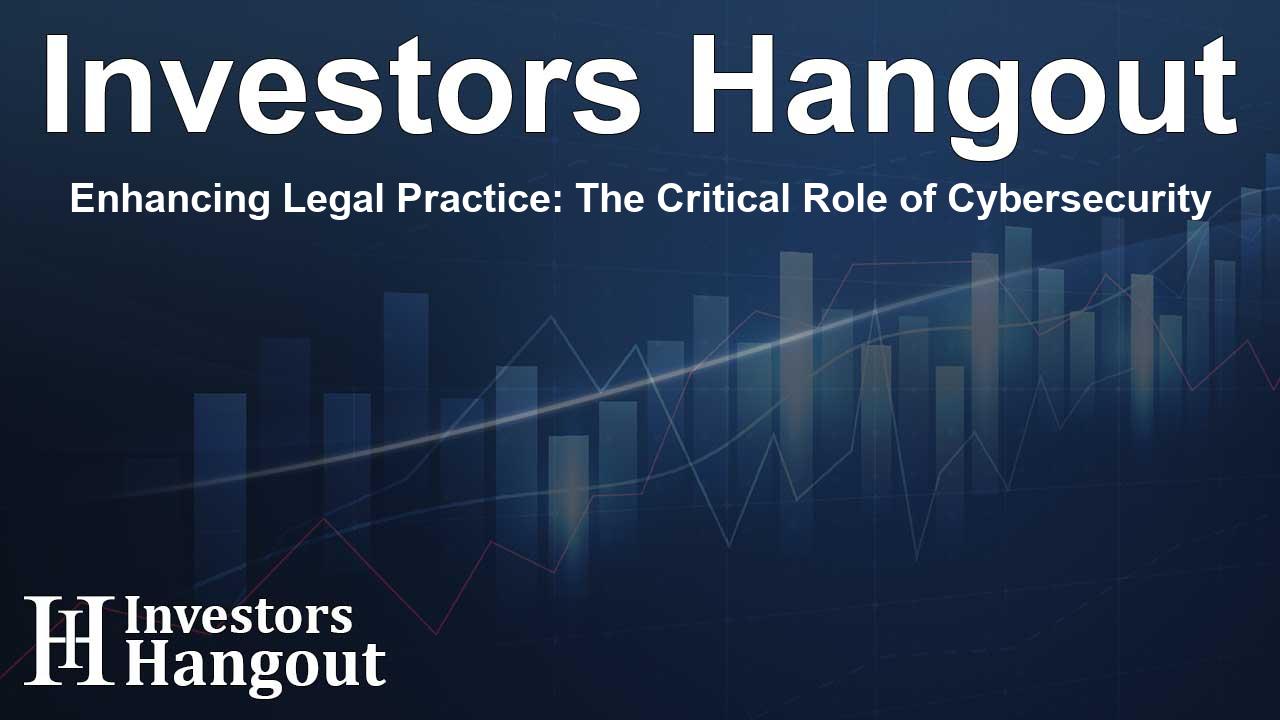Enhancing Legal Practice: The Critical Role of Cybersecurity

Enhancing Legal Practice: The Critical Role of Cybersecurity
David Davis, a prominent lawyer specializing in privacy and immigration law, recently shared his expertise on an increasingly vital topic: cybersecurity for legal professionals. At a major conference for immigration lawyers, he captivated attendees with his insights into the urgent need for effective data protection measures in the legal industry.
Understanding the Threat Landscape
During his presentation, Davis outlined the rising tide of cybersecurity threats that lawyers face today. He pointed out that the legal profession is not immune to cyberattacks, which are becoming more sophisticated as technology advances. As guardians of sensitive client information, lawyers must be equipped with the right strategies to combat these dangers.
Essential Cybersecurity Practices
Davis provided practical advice for law firms and individual practitioners on how to enhance their cybersecurity efforts. He emphasized the importance of implementing multi-layered security approaches, including strong passwords, encryption of sensitive data, and regular security audits. By using these practices, law firms can better safeguard their clients' information.
Regulatory Compliance and Data Privacy
Another crucial aspect of Davis’s talk was navigating the complex network of regulations surrounding data privacy. He stressed that legal professionals must stay informed about the latest compliance requirements to effectively protect client information. With laws continuously evolving, it is vital for lawyers to ensure that their practices adhere to these guidelines.
The Importance of Proactive Measures
“As legal professionals, we have a duty to protect our client's confidential information,” Davis remarked during his presentation. He highlighted the significance of being proactive in the face of growing cyber threats. Engaging in ongoing education about cybersecurity is critical, and Davis urged his colleagues to actively participate in training and discussions on these topics.
Fostering a Security-Conscious Culture
In addition to individual actions, Davis discussed the need for law firms to cultivate a culture of security awareness. This includes not only training staff but also creating an environment where everyone understands their role in data protection. By fostering this culture, firms can minimize the risk of security breaches.
Engagement with the Community
The feedback from participants was overwhelmingly positive, with many expressing gratitude for Davis’s actionable insights. The engaging discussions that followed his presentation demonstrated a clear interest among legal professionals in enhancing their cybersecurity knowledge.
Sector-Specific Challenges
The implications of cybersecurity are particularly acute in the realm of immigration law, which involves the daily handling of sensitive personal data. Davis made a strong case for the necessity of robust cybersecurity measures specifically tailored to protect this type of information, making a compelling argument for the integration of such protocols into the everyday practices of immigration lawyers.
Advancements in Legal Cybersecurity
The Canadian Bar Association (CBA) National Immigration Law Conference serves as an essential platform for legal professionals to explore the latest trends, challenges, and opportunities in immigration law. Davis’s participation underscored a commitment not only to his practice but to the broader legal community’s need for education in cybersecurity issues.
About David Davis
David Davis is the founder of the Davis Immigration Law Office. He holds a degree from the University of Toronto Faculty of Law and has built a reputation for his philanthropic work, involvement in various organizations, and his contributions to legal education as a guest lecturer.
Contact for More Information
For further inquiries about David Davis and his work, interested parties can refer to his official practice, highlighting his commitment to enhancing legal practices through effective cybersecurity.
Frequently Asked Questions
What did David Davis discuss at the CBA conference?
David Davis focused on the critical importance of cybersecurity for lawyers, detailing threats and best practices for data protection.
Why is cybersecurity important for lawyers?
Lawyers handle sensitive client information; safeguarding this data is essential to maintaining client trust and meeting legal obligations.
What are some key cybersecurity practices for law firms?
Key practices include using strong passwords, encrypting data, regular security audits, and staying compliant with regulations.
How can law firms create a security-conscious culture?
By training staff and fostering an environment where everyone is aware of their role in protecting client data, firms can minimize security risks.
What is the significance of the CBA National Immigration Law Conference?
This conference helps legal professionals stay updated on trends and challenges in immigration law, promoting discussions on essential topics like cybersecurity.
About Investors Hangout
Investors Hangout is a leading online stock forum for financial discussion and learning, offering a wide range of free tools and resources. It draws in traders of all levels, who exchange market knowledge, investigate trading tactics, and keep an eye on industry developments in real time. Featuring financial articles, stock message boards, quotes, charts, company profiles, and live news updates. Through cooperative learning and a wealth of informational resources, it helps users from novices creating their first portfolios to experts honing their techniques. Join Investors Hangout today: https://investorshangout.com/
Disclaimer: The content of this article is solely for general informational purposes only; it does not represent legal, financial, or investment advice. Investors Hangout does not offer financial advice; the author is not a licensed financial advisor. Consult a qualified advisor before making any financial or investment decisions based on this article. The author's interpretation of publicly available data shapes the opinions presented here; as a result, they should not be taken as advice to purchase, sell, or hold any securities mentioned or any other investments. The author does not guarantee the accuracy, completeness, or timeliness of any material, providing it "as is." Information and market conditions may change; past performance is not indicative of future outcomes. If any of the material offered here is inaccurate, please contact us for corrections.